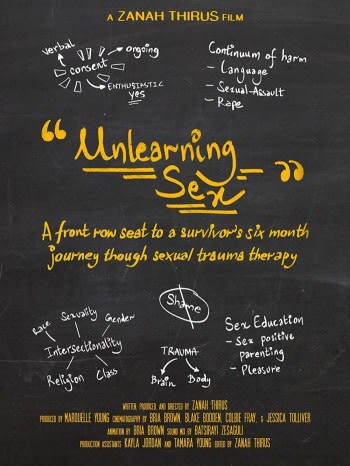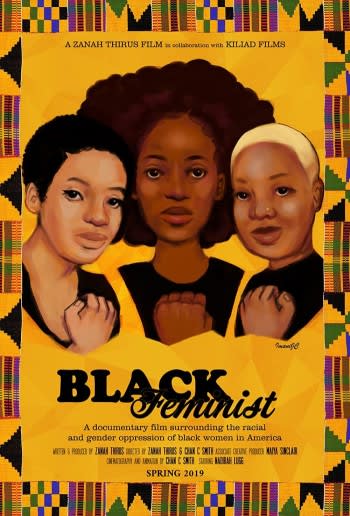“I don’t think there’s enough visibility to Black Women indie filmmakers who are carving their own path in the film space. Telling the stories WE want to tell. I think this could be really inspiring for women filmmakers across the world.” – Zanah Thirus
Internationally awarded film maker and film strategist Zanah Thirus, focuses on merging art and activism through documentary and narrative storytelling, and her films explore reproductive justice, local politics, intersectional feminism, and recovering from sexual trauma.
Based in Chicago, IL, USA, Zanah is passionate about creating impact-driven work that drives social change. She has received many awards for her groundbreaking work, including: Top 10 Filmmakers of the Decade – Diversity in Cannes (2020), Best Documentary feature – Women International Film Festival Nigeria 2022, Best Human Rights Film – Toronto International Women’s Film Festival (2020) and many more.
Document Women spoke with her about her work and her thoughts on racial and gender diversity and inclusion in the film industry.
What inspires your creative process? What inspires you to make the movies and tell the stories you tell?
As a filmmaker, human life and everyday experiences inspire me as a storyteller, especially from the lens of all of the identities that I hold. Most of my films surround Intersectional Feminism and highlight stories of Black women, whether that’s a documentary about Black Feminist Theory, a romantic comedy about a patriarchy-free commitment ceremony, or a visual album surrounding reproductive justice. Narrative films help me paint a picture of a world I wish existed, while documentary filmmaking exhibits a level of truth that no other genre does.
How do you manage to blend your activism with your art?
I’m not a filmmaker who makes films for the hell of it. Every single film of mine has a purpose; most times, it’s to inform/educate/start conversations/raise awareness about a particular subject or social issue specific to Black Women and marginalised groups.
Can you explain the concept of impact-driven films to us? How do you craft a story for a specific audience? How do you communicate your message with that audience?
Impact-driven filmmaking isn’t just about making the film; it’s about strategically getting it to its intended audience. This is why I love filmmaking as much as I love film strategy. My goal with my filmmaking is impact.
All of my ideas are birthed from wanting to address a particular social issue. From there, I’ll either write the narrative script or develop a production outline for a documentary depending on the subject itself.
For example, I’ve never attended a wedding ceremony that didn’t make me cringe because it was engulfed in misogynistic traditions masked as romance, so I wrote a romantic comedy about a Black Feminist couple planning a patriarchy-free commitment ceremony (‘The Love You Want Exists’).

Another example is me being exhausted by the lack of intersectionality and racism within the women’s movement and misogyny within the Black Liberation movement, so I gathered a group of Black Feminist scholars, authors and educators to create a 60-minute educational documentary on Black Feminist theory (‘Black Feminist’).
Once I have the narrative script or documentary outline completed, I’ll map out a marketing and distribution strategy that details who my core audience is and how I intend to reach them. Sometimes that’s through social-justice-themed film festivals. Sometimes it’s through Black feminist organisations; other times, it’s through educational library distribution. It all depends on the subject and the audience I’m trying to reach.

Do you believe that art can drive social change? How can we use art — movies, music, writing, etc. to transform society and impact the world?
Absolutely. I like to think of art as a vehicle to drive social change. Art can be educational and informative in a variety of ways. I think when filmmakers look beyond the accolades and film festivals and focus on distributing their film to places where education and raising awareness is the focus, this is where filmmaking becomes a tool to transform society.
My documentary film ‘Unlearning Sex’ is a great example of this, which followed my sex month journey through sexual trauma therapy and recovery. I wanted this film surrounding sexual trauma recovery to reach medical professionals and folks responsible for survivors’ care. I wanted survivors to see the film and be affirmed and inspired to take action toward their healing.
I also wanted this film to reach activists and advocates for sexual assault prevention across the globe. So I crafted a distribution strategy focused on spaces where those audiences would be. The film was an educational documentary that has been licensed to over 20 universities (a vast number of students experience sexual violence on campus) and screened at places like the American Public Health Association’s National Conference (where a plethora of medical professionals attended) and Sexual Assault Prevention organizations in various states across the US. The film also was awarded at social justice-themed film festivals across the globe.
The most rewarding part of it all was reading emails and messages from survivors letting me know how the film changed or saved their life.
What hurdles have you faced in your career, and how have you/are you overcoming them?
I think I’m learning to balance being inspired and overworking myself. I’m constantly in a space where I find impact-driven filmmaking to be the most driving force in my life. I’m taking more time to sit back and smell the roses and setting more boundaries around work so I can thoroughly enjoy my life.
Do you think the film industry welcomes racial and gender diversity and inclusion? How do you think the industry can evolve more in inclusivity in representation and storytelling?
Truthfully, my goal isn’t Hollywood. I like being an independent filmmaker who isn’t driven to make stories by what ‘sells’. I like having autonomy over the work that I create, who I create it with, and how I distribute it. Although strides have been made toward DEI in Hollywood, there’s not nearly enough. But every single one of my film sets is full of BIPOC, Womxn, and queer filmmakers.
I’m not worried about the lack of diversity and inclusion in Hollywood or the industry at large; I’m focused on my films and my teams. Because I know my sets will ALWAYS be inclusive and representative of true diversity.

Leave a Reply